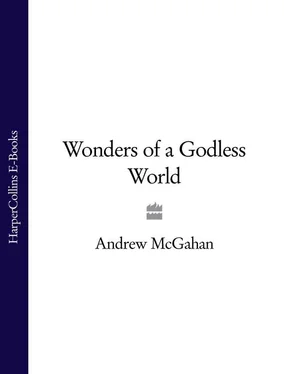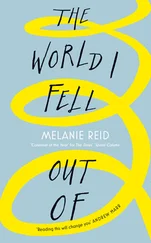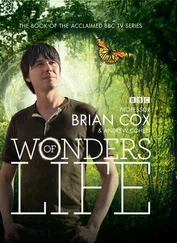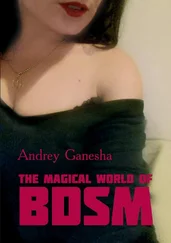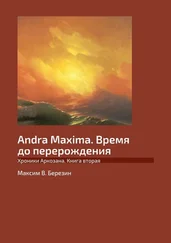1 ...8 9 10 12 13 14 ...17 Face blank, the orphan turned and made her away around to the rear of the laundry, to the spot where they had all been sitting when the eruption began. The concrete slab with the benches and chairs. Something had happened to her there—not only the eruption, but something else, something important.
All she found now was ash. It was heaped on the benches, and had buried the cement square. And yet—there were patterns in the ash. Lines and squiggles and smudges. They meant something, she was sure. Something disturbing.
Laughter startled her. She looked around, but at first could see no one nearby. And then—there, in the bushes by the fence, a huddled, dirty, ash-smeared figure was grinning out at her. It was the witch. Discovered, the old woman grinned wider and laughed again, then came scrabbling out into the open.
Memory stirred once more in the orphan. Yes—that was right, the ash and rain had been falling, and she had turned away from the volcano, and the witch had been there. Of all the patients, she was the only one who hadn’t been scared. The duke and the archangel had run away, and the virgin had been facedown in the mud, terrified. But not the old woman. She had been…excited?
Now the witch scurried over and knelt at the centre of the square. Several objects were cradled in her hands. She dropped them in the ash, then grinned over her shoulder and gestured for the orphan to come and see.
It was a heap of small dead animals.
The orphan saw birds, their wings crooked out stiffly. And mice, their tiny eyes shut. Even a lizard, shrivelled around its own tail. But all of them had been eviscerated, feathers and skin torn away to reveal their bones. And the witch was crooning happily as she prodded at them, her fingers bloody.
The orphan straightened in revulsion. Why had the old woman caught and killed so many creatures? Normally she was content with bones from the kitchen. Ah…but perhaps she hadn’t killed them herself. Perhaps she had just found them that way. The orphan looked up at the volcano. Perhaps that was the answer. The eruption had been harmless enough for people, but for smaller animals the rain of ash and mud might have been lethal.
The witch had followed the orphan’s gaze, and now the old woman rose to her feet, clinging to the orphan’s arm with one withered hand and pointing at the mountain with the other. She was speaking in her low, cracked, spell-casting voice—garbled words, but serious, and terribly eager. Was it some curse she was trying to cast? Some charm? The orphan could grasp no sense in any of it.
She tried to pull away, but the witch clung on. And then abruptly, as had happened with the duke, the orphan was somehow seeing into the old woman—indeed, for an instant it was like she occupied the witch’s skin. All her own perspectives changed and the world warped subtly into something new. The little pile of dead creatures on the ground—what precious things they suddenly seemed, laden with significance, as if to pick one up and pry at its insides would reveal countless secrets. What a gift they were. What a generous thing the mountain had done, to present them so.
And that was the strangest aspect of all. The orphan gazed at the volcano, and it was transformed now. She knew herself that it was only a thing of rock, lifeless, with no intent, and without thought. And yet through the witch’s eyes she saw something else: she saw a being . A slow, inhuman, mighty giant of a thing, exhausted after its fiery labours, and resting now, propped on great arms of stone. A giver of life. A bringer of destruction. A titan to be worshipped and feared and thanked.
Madness. It was just a mountain.
She broke free of the witch’s grip, and the old woman reared back, offended. They stared at each other. Then the witch tossed her head in dismissal. She gathered up her collection of dead things—already, in the heat, they gave off a whiff of decay—and hobbled away, hunched over her prizes, and scanning the ground for more.
The orphan was breathing hard.
What was wrong with everyone today? What was wrong with her ? These glimpses, these emanations she was receiving, from the duke, the witch—they couldn’t be real. They had to be something else, a dislocation in her own head.
She was looking at the ground. She could see the patterns again in the ash. Some resembled scuffed footprints. And there were two strange, straight lines. Then she had it—the lines were made by a wheelchair! Of course. The foreigner—he had been there too. Before the eruption. She had wheeled him out there herself. Why had she forgotten that?
And what had happened to him, afterwards? Someone must have come and wheeled him away to safety. She didn’t know who. But studying the ash now, she saw that in front of the point where the lines stopped, there was an impression in the ash that was dimly human in shape. As if someone had lain there for a time, in front of the chair, while the muddy rain fell. And was that another memory? Had she turned away from the mountain, to see him sitting there, unmoving…
Why did the thought frighten her?
She glanced at her hands. She was still holding the broom.
Cleaning. Cleaning would make her feel better. She would settle into her chores. She would sweep out the halls and change sheets and carry meals. And she would not—although she couldn’t have explained why—go near the crematorium, or the little oven of a room in which the foreigner slept.
And yet still the day would not come right.
The whole hospital was busy cleaning up from the eruption, and the orphan joined in, but sweeping, it turned out, didn’t help clear her mind at all. Ash was everywhere through the back wards, and no matter how she toiled to shift it, the grains continued to rasp irritatingly underfoot. Dust itched in her nose, and sweat gathered in her armpits. It was so hot. The electricity was still off and the back wards, never brightly lit in the first place, had sunk into an airless gloom.
But worse was the thickness in her head. Faces loomed up at her—nurses and other staff, hurrying by—and the orphan knew them, or at least she knew that she was supposed to know them, but recognition took so much effort. They could have been strangers. And when one of the nurses spoke to her, the orphan could only stare back helplessly. The woman’s speech was incomprehensible. The same thing happened when one of the laundry staff accosted her, seemingly to make some urgent request. The words were nonsense. Not just hard to understand, but impossible.
She retreated at last to the kitchen block, and sat in a corner to eat. Normally it was one of her favourite places. Busy. Full of interesting noises and tempting aromas. But in truth, despite not having eaten in a whole day, the orphan was barely hungry. And the kitchen felt all wrong. The smells were bad, the clash of pots and pans too loud, and the yelling of the cooks might as well have been the hooting of animals.
One of the inmates, a young man, was standing in the doorway. The orphan followed his eyes, watching as a cook added salt to a vat of soup. Only suddenly it didn’t look like salt, or anything else she could identify. The substance was black and loathsome, and something moved in it, alive. It was a secret poison they added to all the food. It was a drug. It was what made everyone mad.
Then the inmate was gone from the doorway, and the cook was putting the salt away, and it was only salt.
The orphan fled the kitchen.
Where was she to go? Back to her room, back to bed? She knew she would never be able to sleep. Energy ached in her limbs. Yet everywhere else seemed too crowded with patients and staff. It wasn’t that they were doing anything objectionable. It was just that she could feel them. That is, she imagined she could—their emotions, pressing like heat upon her skin. It made it hard to breathe.
Читать дальше
